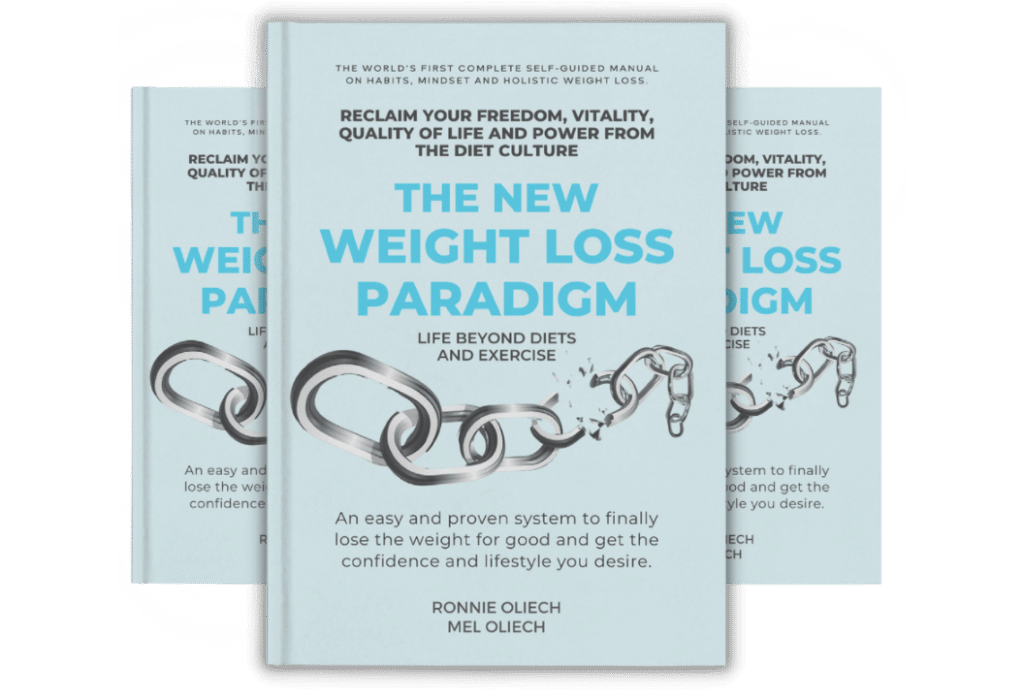Have you noticed that the one thing the fitness industry promotes more than anything else as a way to lose weight is exercise?
Whether you’re signing up for a boot camp, one-on-one sessions with a personal trainer, a 6- or 12-week challenge, or even an online training program, exercise for weight loss is a large focus of the program.
However, exercise isn’t what will make you lose weight.
Of course, exercise will help with weight loss. And whether you want to lose weight or not we should all be moving our body regularly for optimal physical and mental health.
But if you’re relying on exercise for weight loss — whether via a face-to-face program or a virtual one, you’re going to be very disappointed and disillusioned.
Here’s why
Exercise is 3% of the equation
The truth that the fitness industry won’t tell you is that exercise is only 3% of the weight loss equation.
But they put all their efforts into selling you 3% of the solution because that’s all they know and it’s all they can sell. Think about it. Personal trainers make a living from coaching people in exercise. One of the best ways to sell their services is to tell you that increasing your exercise is the only way you’ll lose weight, and their program is the most effective.
While the right type of exercise can definitely change your body shape and help you lose weight, you can’t make it your only focus.
What happens when you rely on exercise?
Firstly, relying on exercise to lose weight will greatly increase your risk of injury and/or burnout.
Like all things, there is such a thing as too much exercise. When you use exercise as your only tool to lose weight, you’ll inadvertently do more than you need to, or you’ll do too much too soon.
One of the biggest problems people have when they set out to lose weight is going from no exercise to exercising every day. Many PTs are guilty of encouraging their clients who haven’t exercised in years, to join their gruelling bootcamp or cardio workout as a way to ‘burn fat’. They also encourage them to exercise on most, if not all days of the week.
But all this does is increase the risk for injury, and makes the whole process difficult and unenjoyable. This increases the likelihood of the participant being sidelined due to injury or giving up because it’s just too hard.
Even if you manage to stick with the program without becoming injured or disheartened, too much exercise can lead to increased levels of stress. Too much stress means you won’t lose weight, and you may actually gain weight. That’s right. Too much exercise can cause you to gain weight!
The best approach when using exercise for weight loss is to take a gradual, progressive approach. You can read more about how to do this in our blog How to progress your home workout.
Of course, exercise does influence your weight and body shape. However, in order to harness the power of exercise, you need to understand the remaining 97% first.
Only then, can you make exercise work for you, not against you.
What influences your weight the most?
There are many things that influence your weight. How much you exercise is certainly one of them. However, the most important and influential are your habits.
Ultimately, it’s your habits that will determine how successful you’ll be in losing weight and keeping it off. Even the most perfectly executed, perfect exercise plan won’t get you the results you’re looking for if your habits don’t support long-term weight loss.
What are habits and how do they influence your weight?
Habits are subconscious thoughts, beliefs and behaviours that are repeated regularly. Whether they are ‘good’ or ‘bad’ depends on how they serve you, but understand that habits are subconscious. That means you do them without realising. That’s why you need to make sure that your habits are designed to prime you for success, rather than sabotaging your efforts.
Let’s look at an example.
Bill is a successful business owner. However, he has neglected his health over recent years while he focused on building his business and raising his kids. He now wants to lose weight so has signed up with a coach.
In the beginning, Bill feels highly motivated and ready to lose weight. He attends all his training sessions, even though it’s hard to juggle with his business and looking after his family. He pays attention to his diet and makes a real effort to cut back on his drinking and the amount of takeaway meals he eats. He even takes the advice of his coach to meal-prep each week to ensure that he has plenty of healthy meals ready to eat.
A few weeks in, Bill has a difficult day at work. He feels angry and stressed and really wants to have a night where he can forget about his problems and his responsibilities. He decides to go out to the pub with his mates, so he can blow off some steam. Bill wants to leave after two drinks, but his mates talk him into staying. Bill doesn’t want to disappoint his friends, so he ends up staying until closing time and drinks a lot more alcohol than he intended. As a result, he didn’t sleep well, ended up sleeping in and missed his workout the next morning.
Due to his lack of sleep and a big night Bill’s mood was low the next day. Because he was running late that morning, he forgot to grab his healthy meal he had already prepared, so he had to buy lunch. He decided that a greasy burger and fries would help him feel better. While he was walking back to work with his takeaway, he ran into Dave who he trains with. Dave tells Bill it was a shame he missed out on his training session that morning as it was a good one and really set him up well for his day. This makes Bill feel even more pissed off, so he ducks into the supermarket to grab a chocolate bar to have after his burger and fries.
After lunch, Bill begins feeling guilty about the food he’d just eaten and the workout he’d missed, so decides he’ll make up for it later by going for a run, even though he doesn’t usually run. While he’s out running, he rolls his ankle and ends up hobbling back home. Bill is now even more frustrated and angry, and tells himself that there is no point even trying if he can’t get everything right. He believes it’s just too hard to lose weight while trying to run a business. He then sends a message to his coach to say he’s quitting, and he’ll come back when things ‘settle down’.
In the example above, it’s clear that Bill’s decision to quit is a result of him not being able to manage and master his habits. In the beginning things go well, but as soon as he hits a snag (a bad day at work), all his good intentions begin to unravel.
- His inability to manage stress means he decides to go to the pub with his mates to blow off steam.
- His people-pleasing habits meant he let his mates talk him into staying , instead of putting his needs first and going home.
- Because he hasn’t mastered his sleep habits, he stays out drinking instead of going home and getting a good nights’ sleep.
- His lack of sleep meant he slept in and missed his workout instead of doing his best to keep his habit consistent.
- His lack of structure and organisation meant he forgot to take his lunch to work.
- He hadn’t mastered how to manage his emotions so he gave into emotional eating and ordered a burger and fries — when he could have chosen a healthier takeaway meal.
- His habit of comparing himself with other people led him to buy a chocolate bar.
- His diet mindset made him feel guilty about bingeing and skipping his workout, which caused him to go out for a run.
- His habit of trying to be perfect led him to quit because he thought it was too hard to get everything right.
As you can see, exercise was not the solution or ‘magic pill’ for Bill’s weight problem. If it was, then he wouldn’t have had any trouble sticking to his program. Instead, Bill’s habits took over and led him to sabotage all the progress he had already made, and ultimately quit because he felt it was too hard to keep going.
This is exactly why exercise doesn’t solve your weight loss problems. Sooner or later, something will come up which will cause your habits to take over. If you have self-sabotaging habits, then you’ll sabotage yourself.
However, if you build habits that improve your mindset and your environment, then you’ll be able to deal with whatever life throws at you, which will make it more likely you stick with your exercise program, remain consistent with it, and get results.
Master the 97% to make exercise work for you
If you weren’t able to lose weight on a previous exercise program, what makes you think you’ll be able to do it on a new one, or a virtual one?
The truth is that focusing on exercise for weight loss is not the answer, despite what the fitness industry will tell you. You need to factor in the remaining 97% — habit, lifestyle and mindset change (which includes your habits around food and nutrition) — in order to create a lifestyle that will help you lose weight and keep it off.
If you continue to focus on exercise — which is only 3% of the equation, you’ll continue to go around in circles becoming more frustrated and disillusioned than ever.
Building and mastering habits one at a time
Identifying habits that hold you back and building new ones to ensure your weight loss success can be difficult. But that’s where we can help you.
As Body and Lifestyle Transformation specialists, we are able to recognise the habits that are preventing you from losing weight. We can also increase your awareness around them by helping you understand when they pop up, how they impact your behaviours, and how this impacts your weight.
With this information, we develop a personalised, customised action plan that will help you develop new routines of behaviour that will support your weight goals. We do this one habit at a time so you don’t become overwhelmed about changing too many things at once. But the end result is that you end up changing your ‘bad’ habits into ‘good’ ones, which help you lose weight, without having to rely on exercise.
Our online Diet Antidote Transformation System (DATSTM Program) The Not-Diet-diet for people who are sick of diets and want more than a good body, bridges the gap between exercise and results. It helps you address the reasons you became overweight in the first place and helps you develop habits, mindset, skills and tools that you can use for life. And the great thing is that these skills can be applied in all areas of your life, making online coaching a great investment in your future.


















